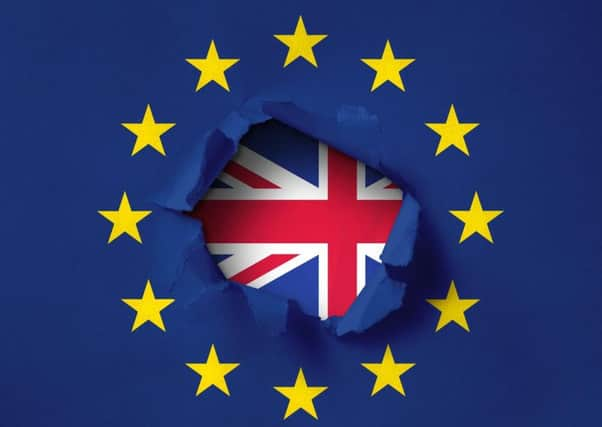Idea the United Kingdom is fragile is has been shown to be a mere myth


Nicola Sturgeon, Carwyn Jones, and their enthusiastic confederates in the Remain campaign all insisted that a Leave posed an imminent, existential to the Union.
Yet whilst there are still real dangers ahead, most of the immediate damage appears to have fallen the other way.
Advertisement
Hide AdAdvertisement
Hide AdThe SNP’s rush to reopen the question of independence the morning after the vote – which does suggest they genuinely believed the line they were selling on Europe – has proven a huge misjudgement. Not only has the European spirit failed to spark the Scottish electorate into revolt, but with the Nationalists, Liberal Democrats and Labour all squabbling over the Remain vote the four-in-10 Scots who backed Leave are being pushed into the Conservative column almost by default.


Carwyn Jones’ assertions that Brexit might provoke the Welsh into seriously considering leaving the UK to rejoin the EU have meanwhile proven the total nonsense we said they were at the time.
The Welsh political establishment was utterly wrong-footed by the principality’s Leave vote and they have been reduced to a bit player in the current battles over the constitution.
Even in Northern Ireland, there hasn’t been the huge upswing that Sinn Fein were hoping for.
Advertisement
Hide AdAdvertisement
Hide AdInstead the DUP increased its share of the vote by 10% on 2015’s Westminster election and took up a crucial position in national politics – one from which they have managed to thwart any prospect of ‘special status’.


Although both Christopher Howarth and myself took the heretic’s view that Brexit would undermine the separatists overall, unionism’s congenital pessimism meant ours was not a view widely shared before the vote.
The year-and-a-half since should be a spur to shake that pessimism off.
The Brexit vote represents the first time anybody has decisively called the bluff of the class I term the ‘devocrats’ – the political classes centred on the devolved institutions. For two decades these have practiced what Canadians call ‘knife-at-the-throat‘ politics: using the threat of secession to extort an endless stream of concessions from the political centre.
Advertisement
Hide AdAdvertisement
Hide AdEach has worked hard to create the impression that their institutions are essential intermediaries between each nation and the British Government – despite consistently higher turnout at Westminster elections – and then painted their electorates as primed to secede if the latest round of devolutionary demands were not met.
This idea, the myth of the fragile Union, underpins what remains of the political logic of further devolution. When somebody insists ‘federalism’ is needed to save the UK, they are operating on the un-evidenced assumption that Scottish (and possibly Welsh and Northern Irish) voters are sufficiently vested in the ambitions of their local governing class to secede.
Last year that proposition was finally put to the test. Unlike in 2014, where the national parties took fright and contrived ‘The Vow’ to convert victory into further retreat, last June’s vote was an unambiguous rebuke to Sturgeon, Jones, and everyone else who had spent the campaign setting out with great certainty how non-English voters would respond.
The exit process still poses danger for the Union, of long-term structural damage if not immediate collapse.
Advertisement
Hide AdAdvertisement
Hide AdOddly though the most serious of these – attempts to inflate the Belfast Agreement so that it mandates ‘full alignment’ with the EU, and the constitutionally-illiterate, anti-unionist tropes about ‘Westminster power grabs’ underlying the assault on Clause 11 of the Withdrawal Bill (which will reserve all current EU powers to Westminster in the first instance after Brexit) – are being driven by Remainers.
Faced with these challenges, the chief danger on the other side has always been that the sort of Brexiteer who cares little for the Union simply waves these challenges through, exchanging permanent special status for Ulster and deep structural damage to the ‘British single market’ for a smooth, if Anglo-centric, departure from the EU in the here and now.
The former is now policed by Arlene Foster and her MPs, and whilst David Mundell has signalled some form of retreat is in the pipeline on the latter we can yet hope that Theresa May will find the confidence to resist any fundamental changes to this crucial part of the Brexit process.
Her ministry has thus far evidenced the firmest set of unionist convictions since John Major’s, and the past 18 months should lend her ministers fresh courage in those convictions.
Advertisement
Hide AdAdvertisement
Hide AdIt’s not so much that Brexit has strengthened the Union – it has in parts and can in others – but that it has stress-tested it and revealed that it is, and has always been, much more durable than devolutionary orthodoxy would have us believe.
Armed with that, let 2018 be the year the Government sets the new course set out by Scottish Tory leader Ruth Davidson: not more powers, but “a bit more Union”.
• Henry Hill is assistant editor at ConservativeHome, a website founded in 2005 to air views of grassroots Tory members. It is independent of the party itself. The article first appeared at www.conservativehome.com